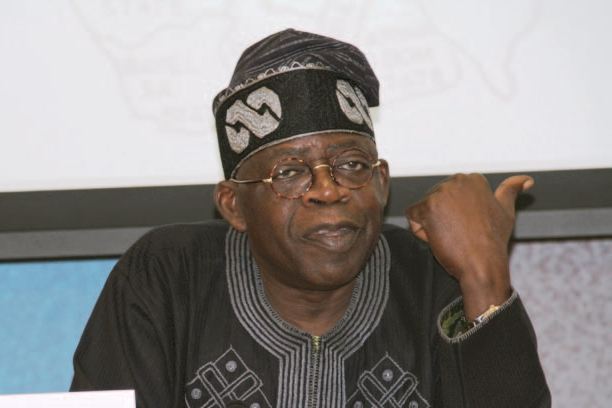Latest
House reconciliation: Tinubu bounces back
Published
9 years agoon
By
Publisher
• Rebuilds to battle El-Rufai, Atiku, Tambuwal, Senate
THE All Progressives Congress (APC) relatively returned to the path of consolidation after the political machine of the party was re-engineered towards resolution of the leadership crisis in the House of Representatives on Tuesday, July 28, 2015. The reconciliation in the House is covertly being celebrated to have subtly restored Asiwaju Bola Ahmed Tinubu, APC national leader, to the control chain of the party’s structure. Several stakeholders in the polity were of the view that Tinubu suffered a temporary setback on Tuesday, June 9, 2015, when the National Assembly was proclaimed inaugurated and the a priori nominees for the Presiding Officers of the Federal Legislature through the party structure were defeated by their opponents. Those party nominees were perceived to be sponsored by Tinubu who they suspected deployed his political sagacity to manipulate APC political machine to guarantee their victory. Several other APC leaders controlling their juridical factions within the party were identified to have mobilized to engage Tinubu in a war of political godfathers which they won the first phase of the battle in guaranteeing the victory of their candidates for the Presiding Officers of the two chambers of the National Assembly.
After attempts to continue the battle adopting the primary strategy predicated on party supremacy hit the rock, Tinubu, while not abandoning the party supremacy reification, modified his strategy. He sustained the advocacy for party supremacy and enforcement of the directives of party leaders on appointment of National Assembly Presiding Officers, recruiting both partisan and non-partisan social forces to give validity and currency to the reified party supremacy to the acceptance of APC leaders as guideline for subsequent appointment of Principal Officers of the Federal Legislature.
Some other APC stakeholders, however, questioned the credibility of the party framework from which the directive emanated. While this controversy was going on, Tinubu conceived the imperative of urgent adjustment of his war strategy from initial reports of subtly blaming President Muhammadu Buhari of neutrality and non-intervention in the crisis in the National Assembly. The President was, however, cautious not to contravene the principles of separation of powers and the relative autonomy of the three arms of government.
Tinubu deepened his political diplomacy; exploited the wisdom in digging deep into the political arsenal of President Buhari to bounce back into reckoning in party control. Tinubu, during the Eid-el-Fitr, led a delegation to visit President Buhari where he eulogized him to high heavens, seemingly propitiating the President into leadership comfort zone. The former Lagos State Governor, in his charismatic leadership content, had in his Eid-el-Fitr message declared that: “the APC Government led by President Muhammadu Buhari is set on an irrevocable path to reverse Nigeria’s decline and determined to be meticulous, consistent and people oriented in its approach.” Soliciting support for Buhari, he had stated: “the change we desire, as promised by the APC, requires our collective effort to make it a reality. We must, individually and collectively, make sacrifices where necessary to help the APC leadership move Nigeria on the right path of development and growth.” Tinubu at all time insisted on party values and strong leadership.
President Buhari appeared inspired by Tinubu’s sustained loyalty. He intensified his mediation which ultimately brokered peace among the warring lawmakers, clearing the way for Tinubu’s men to be accommodated among the Principal Officers of the House.
Buhari had at no time imposed his opinion on the lawmakers or directed them on who should get what appointment and how. He just reasoned with them.
Buhari had at the meeting with APC House of Representatives members in Abuja on Monday, July 27, 2015, before the Tuesday resumption of the National Assembly, appealed to members on the need to uphold the collective interest of the party, urging them to resolve the crisis in the interest of the party to enable them judiciously utilize the mandate given to APC by Nigerians.
Initially, Femi Adesina, Special Adviser to the President on Media and Publicity, had in a statement after the National Assembly leadership election, declared that, “President Buhari had said in an earlier statement that he did not have any preferred candidate for the Senate and the House of Representatives, and that he was willing to work with whomever the lawmakers elected.” He had insisted: “that sentiment still stands, though he would have preferred the new leaders to have emerged through the process established by the party.” Adesina also remarked that President Buhari also acknowledged that a constitutional process has somewhat occurred.
The APC lawmakers in the Lower Chamber of the National Assembly followed up the meeting at the Presidential Villa with another meeting with the APC National Chairman, Chief John Odigie-Oyegun, where several tradeoffs and consensus were made. Accordingly, on resumption on Tuesday, July 28, the Speaker, Right Honourable Yakubu Dogara, announced the Principal Officers of the House who include: Femi Gbajabiamila, House Majority Leader; Buba Jibrin, Deputy House Majority Leader; Alhassan Ado Doguwa, Chief Whip; and Pally Iriase, Deputy Whip. At a factional tradeoff meeting at the weekend, Alhassan Ado Doguwa (APC Kano, North West) was nominated for House Majority Leader; Pally Iriase (APC Edo, South South), Chief Whip, both from the Gbajabiamila camp. From Dogara camp, Buba Jibrin (APC Kogi, North Central) was nominated for Deputy Leader and Chika Okafor (APC Imo, South East) Deputy Chief Whip. Dogara’s reversal of those decisions ended the crisis in the House as well as secured victory for Tinubu’s men. More importantly, APC is now realizing the efficacy of negotiation, tradeoffs and consensus building.
Not giving anything to chance, the APC National Leader intensified his political diplomacy the same Tuesday, visiting President Buhari at the Presidential Villa. Some of his loyalists revealed that Tinubu was on diplomatic shuttle for the second phase of the power tussle which now shifts to the Senate where he will engage other godfathers in a grand battle.
In a seeming political sophism, Tinubu applied a modest eulogy on the President when he exonerated Buhari from being too slow as widely perceived. According to the APC national leader, “… How long ago? May 29th was when this President was sworn in. It is an international norm all over the world, there is an honeymoon period, at least minimum of 100 days honeymoon… you won’t allow honeymoon at all? You said change is not coming, change is not by magic, it is driven by the people. The spirit and the character and the planning…We have had so much problems in this country in the past because we run into policy blind folded without adequate and effective planning. You don’t have results unless you plan well.” Tinubu had also explained: “the purpose of this visit is to see my President and our leader. The purpose is to ensure we are on the right track and coming back from a very successful trip to United States of America.” He had declared inter alia that, “…when the National Assembly job starts, the job of lawmaking in earnest, the President needs to step in once in a while as he did to let people understand the import of the expectations of the public and, particularly, of the international community on various Programmes and institutions. We need to build the institutions, make it viral and effective for the entire country. To step in to douse any conflict is not a wrong thing…”
At different times Governors Nasir El-Rufai of Kaduna State, Ibrahim Shettima of Borno State, Aminu Tambuwal of Sokoto State, former Vice President Abubakar Atiku, former Governor Aliyu Magatakarda Wamakko, Senator Rabi’u Musa Kwankwaso, among others, in alliance with former President Olusegun Obasanjo, were alleged to have joined forces in the APC against Tinubu. At a time Tinubu was reported to have scolded Tambuwal at his residence in Abuja, reportedly rebuking the Sokoto Governor that he has broken his link with the South West.
A loyalist of Tinubu disclosed that the national leader will be taking the battle back to those on the other side as they shift the battle field to the Senate.
APC governors were gathered to have met at the Imo State Governor’s Lodge, Abuja, last week, to plan how to intervene over the discontentment in the Senate. Some stakeholders contend that unlike the House of Representatives that left open window for dialogue with existing vacancies in the House, all the Principal Officers in the Senate have been appointed.
APC National Chairman was gathered to have, however, assured that, “the issues are being looked into and are being resolved. Things will work out and the party will ensure that it delivers on the campaign promises it made to the people…”
Meanwhile, President of the Senate, Dr. Bukola Saraki, has sets up a 12-member Ethics and Privileges Committee to reconcile members of the Upper Chamber of the National Assembly.
Members of the committee include Senator Samuel Anyanwu (PDP, Imo East), Chairman; Dino Melaye, APC, Kogi West; Binta Garba, APC, Adamawa North; Peter Nwaboshi, PDP, Delta North; Jeremiah Useni, PDP, Plateau South; Babajide Omoworare, APC, Osun East; Bala Ibn Na Allah, APC, Kebbi South; Tayo Alasoadura, APC, Ondo Central; Muhammad Ubali Shittu, APC, Jigawa North-East; and Olaka Johnson Nwogu, PDP, Rivers South-East.
Trending

 Football6 days ago
Football6 days agoGuardiola advised to take further action against De Bruyne and Haaland after both players ‘abandoned’ crucial game

 Aviation7 days ago
Aviation7 days agoDubai international airport cancels flights as flood ravages runway, UAE

 Aviation1 week ago
Aviation1 week agoNCAA suspends three private jet operators for engaging in commercial flights

 Featured4 days ago
Featured4 days agoPolice reportedly detain Yahaya Bello’s ADC, other security details

 Comments and Issues5 days ago
Comments and Issues5 days agoNigeria’s Dropping Oil Production and the Return of Subsidy

 Education5 days ago
Education5 days agoEducation Commissioner monitors ongoing 2024 JAMB UTME in Oyo

 Business5 days ago
Business5 days agoMaida, university dons hail Ibietan’s book on cyber politics

 Education7 days ago
Education7 days agoOsun NSCDC solicits cooperation towards national assets protection

